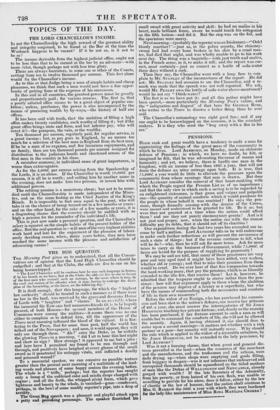PENSIONS.
HIGH rank and great wealth have a tendency to unfit a man for appreciating the feelings of the great mass of the community in which he lives. Lord ALTHORP, on Monday, made an elaborate defence of Pensions ; in which, we have no doubt, he felt, or imagined he felt, that he was advocating the cause of reason and humanity ; and yet, we believe, there is hardly one man in the kingdom, with an income of less than 500/. a year, that will not deem the defence an utter outrage upon both. It is true, that 75,0001. a year would do little to alleviate the pressure upon the community from whose earnings that sum is drawn. But does Lord ALTHORP consider the removal of that heart-rankling with which the People regard the Pension List as of no importance ; and that the only view in which such a saving is to be regarded by an enlightened statesman, is that gross and vulgar and palpable one—the quantity of animal comforts which it would purchase for the people in whose behalf it was remitted? He says the pen- sions, though formally ceasing with the demise of the Crown, were meant and understood to be granted for life. Be it so; but were they not granted at a time when the nation could afford them ? and are they not purely eleemosynary grants? And is it not just and proper, now, when the nation can with the utmost difficulty pay its debts, that it should cut off its charities ? Our expenditure during the last two years has exceeded our in- come by half a million. Lord ALTHORP tells us he will endeavour to make such further reductions as will prevent the recurrence of such a state of things ; but if the revenue continue to fall, what will he do ?—why, then he will ask for more taxes. Ask for more taxes to carry on the business of Government, while 75,000/. of taxes are levied for the purpose of supplying its generosity ! We may be and are told, that many of these pensioners are very poor and very aged (and it might have been added, very useless, whether old or young) ; and that to take their pensions from them would be cruel. Do we ever hear of that fine compassion towards the hard-working many, that pay the pensions, which is so liberally extended to the idle few, that receive them? Let it, however, be admitted that the taxpayer ought to starve rather than the pen- sioner: how will that argument apply to those whom the abolition of the pension may deprive of a luxury or a superfluity, but who have the means of commanding both the necessaries and comforts of life in their own resources ?
Before the widow of an Ensign, who has purchased his commis- sion and been shot in the nation's defence, can receive her pittance of 401. a year, she must answer the interrogatories of Sir Jonx HOBHOUSE touching her private fortune; and, dearly as the annuity has been purchased, if her fortune amount to such a sum as will enable her to command the comforts of life, she will not be allowed the annuity. Again, if having obtained it, she should dare to enter upon a second marriage—it matters not whether with a rich partner or a poor—her annuity will instantly cease. Why should the rule which is applied to the widow of a miserable subaltern, by Sir JOHN HOBHOUSE, not be extended to the lady pensioner, by Lord ALTHORP?
Was it not a burning shame, that when great and general dis- tress prevailed in the land—when the resources of the merchant and the manufacturer, and the tradesman and the artisan, were .daily drying up—when shops were emptying and gaols filling, from beggary in despair—was it not infamous that undeserved and unrequired thousands should be squandered on the titled mothers of men like the Dukes of WELLINGTON and NEWCASTLE, already gorged with wealth ? If the late Secretary of the Admiralty, from his poverty, or.from hatred of his own flesh, was unable or unwilling to provide for his niece, does it follow, either by the law of charity or the law of honour, that the =don shall continue to Mrs. G. RARRO* the 300/. a year with which they were burdened for the lady-like maintenance of Miss ROSA. MATILOA CROIOR ? •



























 Previous page
Previous page